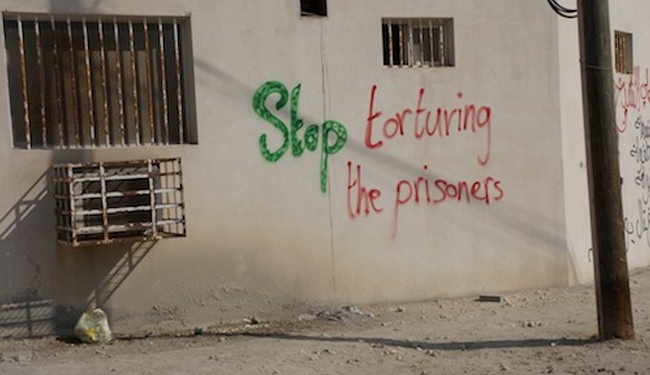Prisoners in a Bahraini jail are suffering from “mistreatment” and their basic humanitarian needs are being ignored, says the al-Wefaq National Islamic Society, the main opposition party in Bahrain.
In a statement released on Tuesday, the al-Wefaq human rights department voiced “grave concern” about conditions of the Bahraini activists locked up in the Jau prison.
Bahraini families complained about the lack of humanitarian basics such as “water and air-conditioning despite the very hot weather,” al-Wefaq said.
The opposition bloc added that it “repeatedly” received complaints about “various human rights violations such as cruel and degrading treatment, torture, and being held incommunicado.”
“Many prisoners also suffer from a lack of adequate medical care,” and they are kept detached from the outside world, it added.
“The situation of the prisoners must be improved immediately in respect of universal human rights standards and the conventions which Bahrain is part of. Those involved in the practice of human rights violations are criminals who deserve to be punished.”
Meanwhile, a Bahraini rights activist, who has spent the last two years of his life in jail, censured the Al Khalifa regime for imposing a media blackout in the Persian Gulf country.
“No journalists from foreign media are allowed to come to Bahrain. No human rights group or organization can get into Bahrain,” said Nabeel Rajab, adding that international media, on the other hand, are also “boycotting our revolution because of the impact of those western governments that support Bahrain dictatorship.”
Since mid-February 2011, thousands of pro-democracy protesters have staged numerous demonstrations in the streets of Bahrain, calling for the Al Khalifa royal family to relinquish power.
On March 14, 2011, troops from Saudi Arabia and the United Arab Emirates invaded the country to assist the Bahraini government in its crackdown on the peaceful protesters.
According to local sources, scores of people have been killed and hundreds arrested.
Physicians for Human Rights says doctors and nurses have been detained, tortured, or disappeared because they have "evidence of atrocities committed by the authorities, security forces, and riot police" in the crackdown on anti-government protesters.
/129

